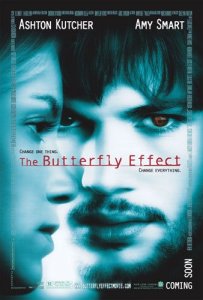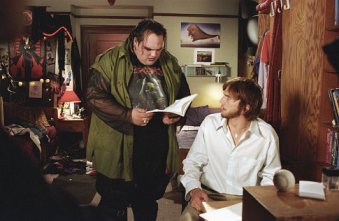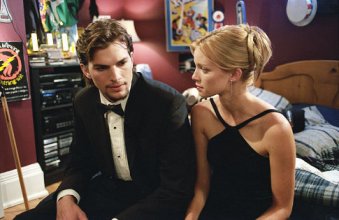|
The Butterfly
Effect
For those
that remember high school English, the topic may be familiar.
If only you could somehow go back to a time in your past,
what might you do? You might dare to ask out that girl that
kept smiling at you at the video store. Or you could go back
further, and this time remember where the brake is on that
moped. Perhaps, just perhaps, you could convince your younger
self not to throw away the pristinely kept boxes to your Mego
action figures, and then you wouldn't choke every time you
went to a collectibles show.
However,
if you had a really crappy childhood like Evan Treborn (Ashton
Kutcher), you would be far more concerned with preventing
lurid, horrible and occasionally sleazy things from happening
to you, even if you don't remember what they are.
Such
is the premise of The Butterfly Effect, an attempt
at a serious dramatic fantasy (you shouldn't call it science
fiction, because there really isn't any science involved).
While they have you in their grasp, directors/writers J. Mackye
Gruber and Eric Bress will have you quite convinced this is
something deep. It's only afterward that you realize that
even though the puzzle pieces go together very slickly, there
are problems with the picture.
From
the get-go, Gruber and Bress grab you with a scene of a bedraggled
Evan hiding from pursuers under a desk. Desperately, he reaches
up for a notepad and begins writing what may be his last will
and testament. As he strains to complete the lament, "I was
too late to save her," the film switches back to Evan
at 8.
The first
fifteen minutes or so jolt along like that, never quite letting
us understand what's going on. Part of that is plot device.
Young Evan (Logan Lerman) suffers from blackouts, and thus
often misses crucial events in his life. Doctors call them
stress-related; more cynical viewers will call them cheap
excuses to make us jump out of our skins. More often than
not, Evan awakens from a blackout to find people crying, moaning
to themselves, or threatening to kill him for what he's done.
So effective
are these blackouts that you might think you've stumbled into
a straight-up slasher pic. Though he can't remember doing
it, Evan draws a picture of a hockey-masked madman standing
over a couple of victims, bloody knife in his hand. Later,
his mother (Melora Walters) catches him with pretty much the
same knife. And once you find out his father is in an insane
asylum and is named Jason, well, you have to wonder.
But it's
all for naught, red herrings planted (sometimes for no other
reason than to mislead the audience) before we get to the
meat of the story.
As an
adult, Evan discovers that he can send his mind back to those
blackouts. In fact, that's why he blacked out; his adult mind
crowded out his consciousness. First he tries to physically
trace his past, visiting the young woman (Amy Smart) that
he could have loved when she was a girl if he and his mother
had not moved.
When
that only leads to further tragedy, Evan determines to go
back and prevent whatever messed things up in the first place.
Unfortunately, it has repercussions that lead to greater tragedy.
And so on, and so on. However, at no point does Evan trigger
a takeover of the world by intelligent apes, so rest easy
on that account.
Actually,
the script treats this with a fair amount of thoughtfulness,
and though it has a proclivity for cheap scares, the direction
is paradoxically subtle. Each alternate reality allows for
tiny details to be different, some obvious and some not, and
most, thankfully, not overexplained. (My favorite is the simple
touch of Evan taking the opposite side in his dorm room from
his first reality.)
Perhaps
the biggest surprise is how well Kutcher works in this part.
Well-known as a doofus, he still flashes that persona here.
But he also has an unexpected dogged earnestness; Evan has
devoted his teen years to education, driven to discover why
he suffers blackouts. Being more booksmart doesn't make a
person necessarily wiser, so when Kutcher betrays his dumb
guy smile, it's acceptable. Evan tentatively enjoys each new
reality, though it makes him nervous.
A clever
touch on that count is how others notice that he's different.
At one point Smart's character Kayleigh comments he even has
a different walk. We never see a different Evan, but new memories
do intrude upon him in a hemorrhaging avalanche. At times,
the personality he would be breaks through, especially in
a reality where he's a frat guy, and he himself finds it disconcerting.
Not as disconcerting as his tendency to move his lips when
he reads, but then again, it's Kutcher, and critics just can't
change their opinions that quickly.
In the
end, The Butterfly Effect tries to move toward a stunning
ending, but loses its nerve. Not quite a cop-out, the directors
still left an unsatisfying amount of room to interpret "happily
ever after."
For a
January release, this film makes a nice treat. Far from perfect,
it still attempts to actually say something of value. If you
have a delicate sensibility (and how did you find your way
here?), however, you should skip it. Those black holes
in Evan's memory hold some disturbing, though not graphic,
images. Everybody else, dig in, but don't try to fill the
black holes in the plot.
Rating:

|








